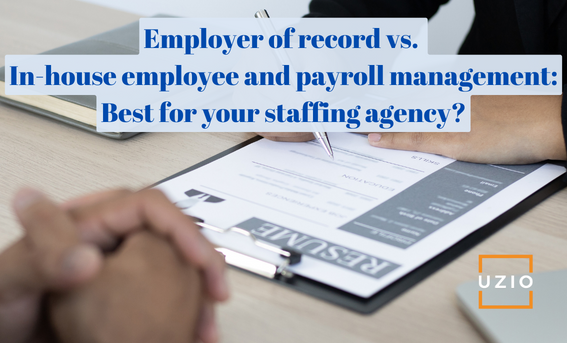Introduction
Are you paying 20% to 25% of an employee’s wages to the Employer of Record (EOR) you are using for your staffing agency? When is the right time to bring these functions in-house? In this article we explore the pros and cons of using an EOR and provide you with a framework you can use when deciding whether to bring some of your front office and back office functions in-house.
What is an EOR?
EOR stands for “Employer of Record”. An EOR is a company or organization that takes on the role of an employer for workers who are actually working for a different company or organization. This can be beneficial for companies that need to quickly and easily expand their workforce, or for workers who prefer the stability and benefits that come with being employed by a single organization.
The EOR is responsible for all of the administrative tasks associated with employment, such as payroll processing, tax filings, benefits administration, and workers’ compensation insurance etc. The workers are still under the direction and supervision of the company they are working for, but the EOR is responsible for all of the legal and administrative aspects of employment.
This arrangement is often used by staffing agencies or other companies that provide temporary or contract workers to other organizations. By using an EOR, these companies can avoid the administrative burden and legal liabilities associated with directly employing workers, while still being able to quickly and easily expand their workforce as needed.
What are the advantages to a staffing agency of using an EOR?
For staffing agencies who are small and don’t want to take on the tasks associated with payroll or billing for their employees, EORs can be a great alternative. For a percentage of their employees wages, which varies based on what all tasks you are outsourcing to them, they can reduce the administrative burden by taking over administrative tasks like:
- Payroll processing
- Tax filing
- Benefits administration
- Workers compensation
- Background checks
- Drug testing etc.
Here are some additional benefits of using an EOR:
Legal and Compliance Support:
EOR services can help businesses stay compliant with employment laws, regulations and guidelines as they typically have legal and compliance expertise to handle complex employment-related regulations.
Increased Flexibility:
Until the staffing agency has a steady, reliable and growing demand for their services, it makes sense to use an EOR for their back office services instead of hiring full time employees and signing up for different technology solutions to manage the back office.
What are the disadvantages to a staffing agency of using an EOR?
Cost:
The major disadvantage is the cost in the form of fees paid to the EOR. Depending upon the services being provided, an EOR may charge as much as 20% of the employees wages. That is a big chunk of change taken right off the top. This cost will have a major impact on the profitability of the business. Sometime EOR may even insist on being paid a higher percentage than normal if the hourly rates of the employees is below a certain amount. That is like a double whammy as you are getting paid a lower rate and you have to pay a higher percentage of those wages to the EOR.
Invoicing & Payroll Issues:
Because you have outsourced payroll & billing to the EOR, you have less control over the process. We have seen countless cases where staffing agencies face issues related to payroll and invoicing done by the EOR. For example in case of a staffing agency providing traveling nurses, the EOR paid the nurses for hours unapproved by the hospital. When the hospital was billed for those hours, they contested the invoice because the hours were not approved. In another case, the EOR inaccurately charged the staffing agency fees which should not have been charged to the agency.
Which model is right for you?
It makes financial sense for the established agencies and agencies of a certain size to manage their back office functions inhouse.
So the question becomes at what size you should bring this function inhouse? To make that decision, you should calculate the total cost involved in doing all the back office operations in house and compare it against the fee you are paying to the EOR.
Here are the different cost elements involved in bringing the function in house.
Cost of hiring inhouse staff to manage your back office
You will need to hire someone, full time or part time, to run your payroll, billing and other administrative tasks. Depending upon the location and experience of the person, the total cost of such an hire could be between $50,000 to $75,000 a year.
Cost of technology solution to manage your back office
You will need a technology solution to manage your back office function. There are many solutions available in the market including the one offered by UZIO. The solutions vendors typically charge a per employee per paycheck or per employee per month fee for these services. For example, an all-in-one platform which does hiring, onboarding, time tracking, payroll and billing might cost you between ten to fifteen dollars per employee per month.
Cost of workers compensation insurance
Cost of workers compensation will depend upon the kind of work your employees will be performing. Any business insurance broker should be able to give you a quote for that.
Cost of doing background checks & drug test
There are hundreds of vendors who do background checks and drug tests. These are not very expensive offerings. The key decision you will have to make will be whether you are open to doing background checks and drug tests in advance of the contract being awarded to keep the work force ready, knowing that employees might not wait for your contract and might accept a position with some other employer. This can get costly if not managed correctly.
Conclusion
Ultimately the decision to use the EOR or bring it in house will come down to the cost and need for control. When making this decision, you should not only take into account the current cost but also factor in your growth plans. For example if you are planning to significantly grow your business in the next year or so, it may make sense to start planning to bring the back office function in house. Please review your contract with the EOR carefully because there may be charges or fees you may be required to pay if you do not meet certain notice period requirements to terminate the contract.
Get in touch with one of our payroll experts to set up a demo and start your 30-day free trial.















